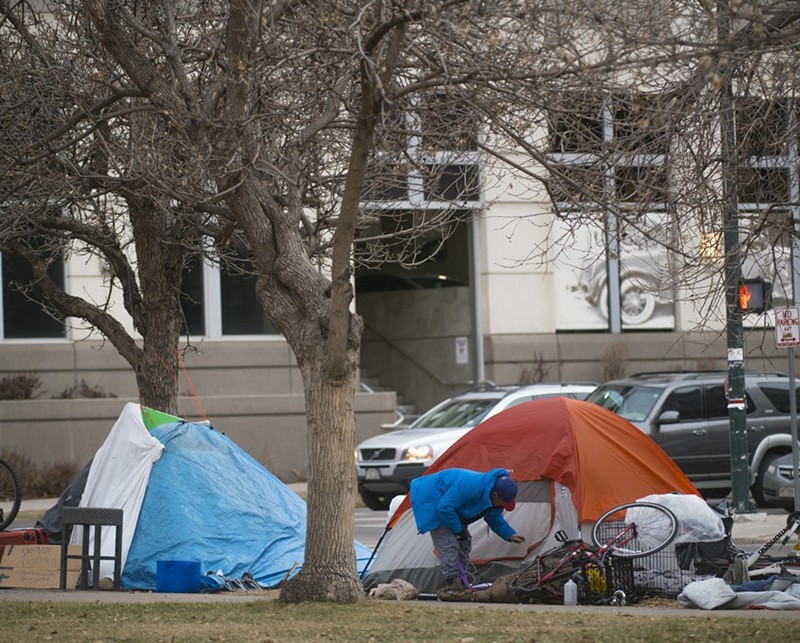A common trope about the people living on the streets of Denver and throughout the metro region is that they've come to the Centennial State in pursuit of legalized cannabis and then become homeless. But a new report shows that's actually not the case.
"By and large, people in our community, in our state, are the ones who are experiencing homelessness," says Jamie Rife, executive director of the Metro Denver Homeless Initiative.
MDHI released its annual State of Homelessness report on January 26. A key finding is that 87 percent of individuals who shared previous address information with homelessness services providers in metro Denver indicated that their last permanent address was in Colorado.
In total, 4,384 people accessing services from July 2021 through June 2022 shared their permanent address with providers, who then plugged this information into the Colorado Homeless Management Information System (HMIS), which organizations and governments use when interacting with homeless individuals in metro Denver. Of the people who provided addresses, 3,810 provided a Colorado location.
Seventy-eight provided addresses inTexas, 47 in California, 39 in Florida, 28 in Arizona, 25 in New Mexico and 24 in Oklahoma.
For Rife, this data is important because it flips on its head the idea that people experiencing homelessness in Colorado are some sort of "other" population that doesn't deserve help.
"I think for some people, it makes them feel as if it maybe isn't our issue, but the issue of the changing demographics of Colorado. It's important to dismantle that, because no one should be excluded from safe and stable housing. Whether they're from Colorado or not, this is an issue that's here, and we have to address it no matter what," Rife says.
The data doesn't provide the complete picture, though, since the 4,384 people who shared their address represent just a portion of the 27,860 individuals who accessed services in the metro region during the same time period and whose data was plugged into HMIS. That's because the question is not a mandatory one.
The Metro Denver Homeless Initiative covers seven counties: Denver, Arapahoe, Adams, Douglas, Jefferson, Boulder and Broomfield. The Point in Time count for the seven counties from January 2022, which captured the number of people living on the streets and in shelters in the region for one given night, was 6,884. But this State of Homelessness report shows that the breadth of the problem is much larger, as signified by the 27,860 figure. The next Point in Time count takes place on January 31, and the results will be available later this year.
Another key finding from the State of Homelessness report is that the vast majority of people experiencing homelessness in metro Denver aren't choosing to live without a home.
"There is a common misconception that homelessness is a lifestyle choice for many," Rife says. But in fact, 94.4 percent of people whose data was entered into the HMIS system from July 2021 through June 2022 said that they weren't choosing to be homeless.
"This is an issue that stems from systemic failures, and we have to address it that way. If we keep this narrative going that homelessness is a choice, then it makes it much harder to change the system," Rife points out.
The report notes that Colorado has the seventh-highest housing shortage in the United States, while also having the eighth-highest housing wage in the country. The housing shortage is particularly acute in metro Denver, which ranks sixteenth out of more than 300 metropolitan areas, with a shortage of almost 70,000 units.
"Affordable housing continues to be at the root of this, and it's not people's choices," Rife concludes. "The main causes of homelessness are the inability to pay your rent or mortgage, and that is something we just, as a region, need to face if we're going to tackle homelessness."
[
{
"name": "Air - MediumRectangle - Inline Content - Mobile Display Size",
"component": "12017618",
"insertPoint": "2",
"requiredCountToDisplay": "2",
"watchElement": ".fdn-content-body",
"astAdList": [
{
"adType": "rectangle",
"displayTargets": "mobile"
}
]
},{
"name": "Editor Picks",
"component": "17242653",
"insertPoint": "4",
"requiredCountToDisplay": "1",
"watchElement": ".fdn-content-body",
"astAdList": [
{
"adType": "rectangle",
"displayTargets": "desktop|tablet"
},{
"adType": "rectangle",
"displayTargets": "desktop|tablet|mobile"
}
]
},{
"name": "Inline Links",
"component": "18838239",
"insertPoint": "8th",
"startingPoint": 8,
"requiredCountToDisplay": "7",
"maxInsertions": 25
},{
"name": "Air - MediumRectangle - Combo - Inline Content",
"component": "17261320",
"insertPoint": "8th",
"startingPoint": 8,
"requiredCountToDisplay": "7",
"maxInsertions": 25,
"watchElement": ".fdn-content-body",
"astAdList": [
{
"adType": "rectangle",
"displayTargets": "desktop|tablet"
},{
"adType": "rectangle",
"displayTargets": "desktop|tablet|mobile"
}
]
},{
"name": "Inline Links",
"component": "18838239",
"insertPoint": "8th",
"startingPoint": 12,
"requiredCountToDisplay": "11",
"maxInsertions": 25
},{
"name": "Air - Leaderboard Tower - Combo - Inline Content",
"component": "17261321",
"insertPoint": "8th",
"startingPoint": 12,
"requiredCountToDisplay": "11",
"maxInsertions": 25,
"watchElement": ".fdn-content-body",
"astAdList": [
{
"adType": "leaderboardInlineContent",
"displayTargets": "desktop|tablet"
},{
"adType": "tower",
"displayTargets": "mobile"
}
]
}
]












